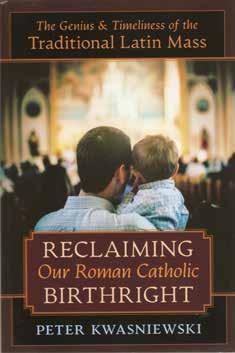
3 minute read
Review - Reclaiming our Roman Catholic birthright
The treasure that is ours
David Forster reviews a new book by Peter Kwasniewski
During the recent Covid lockdown, many Catholics took the opportunity to sample liturgies from places they could not normally attend, which may have included the Traditional Latin Mass. Some of these virtual worshippers are attending in person now churches are reopening. Anyone wanting a readable and informative primer on the arguments surrounding the Old Mass would be well directed to Peter Kwasniewski’s new book, Reclaiming Our Roman Catholic Birthright: The Genius and Timeliness of the Traditional Latin Mass.
Unlike Kwasniewski’s previous books on the liturgy, this one is more apologetic in tone – it is written to convince and defend a position. He explains that before he was a Traditionalist, he was a Charismatic, then a John Paul II Ultramontane and a ‘reform of the reform’ supporter – all the while using his musical gifts as a Novus Ordo choir director. He is writing as someone who has experienced the benefits of the Old Rite, and wants to share them with others.
This book is largely a reworking of articles, blog-postings, and talks given by its author. This gives it a very readable tone, and can be dipped into at any point. I particularly enjoyed the middle section, which deals with objections to the Latin Mass from those who want to defend the Novus Ordo. There is a chapter called ‘Twelve reasons not to prefer the Novus Ordo’ replying to an article by the well known Fr Dwight Longenecker. One of the reasons given is that the new Mass is “flexible.” But this is not an advantage, quite the reverse: “The liturgy is a ritual action in which the actors lose their idiosyncratic personality and adopt a persona that befits the mysteries enacted.” (p114) Flexibility makes the liturgy a “moving target” and totally undermines the enterprise.

Another argument for the Novus Ordo is that it is “accessible” to the people, especially when it is celebrated in the vernacular language. However, the goal of easy intelligibility led the reformers to dumb down much of the content; the heavy price we pay for accessibility is “superficiality and boredom.” The Traditional Mass is “steep, craggy and sublime” with challenge for the worshipper “opening up endless vistas of new discoveries.” (p113)
Many worshippers at the Novus Ordo – and I mean here the more devout and regular – are attached to the Lectionary, the daily cycle of readings from the Bible. The new Lectionary has been highly praised, for example, by respected Biblical scholar Scott Hahn. Those coming to the old rite are sometimes surprised by the more limited range of Biblical readings they find. Kwasniewski returns to this point a number of times. The New Lectionary admittedly contains more Scripture, but possibly too much, and this works against familiarity, whereas the old cycle is a “crash course in lectio divina” – meditation on the very word of God. “The traditional liturgy as a whole is permeated with scriptural citations and allusions” (p163) far more than the Novus Ordo, where the readings have a skewed selectivity which often skips the “hard sayings” about “the wrath of God, the evil of sin, or the danger of sacrilegious communions.” (p118)
Often when reading Kwasniewski, I remembered the late Michael Davies, whose writings were prominent in the English-speaking world in the late 1980s when I personally started to read about the liturgical revolution. There is the same popular touch, with much learning worn lightly but applied to great effect, and command of language. Kwasniewski does not spare the new liturgy or people; sentences like “The Novus Ordo is a contradiction in terms: an unliturgical liturgy, an unceremonious ceremony, a relaxed ritual, a do-it-yourself template for collective devotion” (p129) are readable and make a serious point with a lightness of touch.
The final section is called “For a darkening Church, the light is Tradition” where the author calls upon fellow Catholics to seek out the traditional liturgy as an antidote to “the increasingly Satanic onslaught” (p317) in the Church and the world. Those of us who are already Traditionalists might take this to heart too: Do we prepare well for the sacraments? Do we make the effort to support special events as a witness to our convictions? Do we value sufficiently, both publicly and within our hearts, the treasure that is ours?
Reclaiming our Roman Catholic Birthright is published by Angelico Press and is available from the LMS online shop, paperback £18 + p&p.










